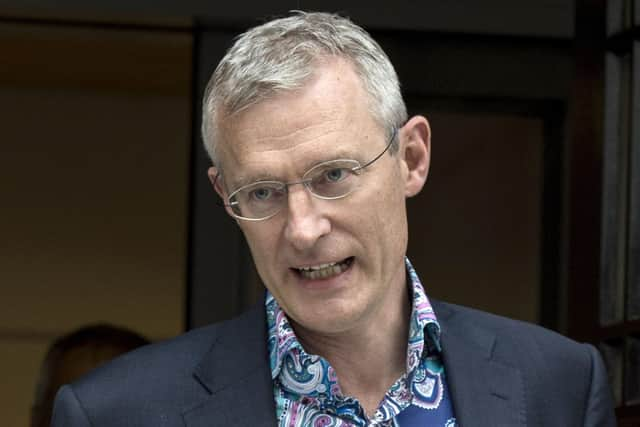Why BBC is guilty of ageism over music as radio presenter quits – GP Taylor


His show had great audience figures and yet, according to Allen, it was cancelled due to it attracting the wrong type of listeners.
By wrong, Allen meant that the people who listened to the show were too old and that the BBC wanted to attract a younger age group.
Advertisement
Hide AdAdvertisement
Hide AdIt appears that the search for youth is a growing obsession for our national broadcaster. You only have to listen to how the music output has changed on Radio 2 to know that.


It would appear that many of the old classics don’t get played any more. The desire to attract a younger audience means that the style of programmes and the age of presenters is changing fast.
Yet, the BBC don’t seem to realise that the audience they are after wouldn’t listen to them in a month of Sundays. Most people under 35 consume their music and news in a different way. The BBC is probably the last place they will look for content. The internet is the ‘one stop shop’ for young people’s media needs.
It is strange, then, that the BBC should seek to ruin its schedules by trying to get listeners that are just not there. In doing this, it forsakes the core listenership of the over-40s that support the broadcaster with their daily listening.
Advertisement
Hide AdAdvertisement
Hide AdDuring lockdown, it was the BBC that got me through the days. Chirping away in the background of my stay at home life, the schedule was always the same. 6 Music from 5.30 to 7.30 in the mornings with a quick stint of the Today programme, half an hour of Zoe Ball and her shouty breakfast show, then Ken Bruce, Jeremy Vine and Steve Wright. It was back to 6 Music from tea-time, ending the day with Marc Riley and Gideon Coe.
What became obvious was that the listenership across all these channels was older than the BBC would like. One thing was certain, there were a lot of older people listening to the stations and getting in touch.
Why then, does the BBC think it is acceptable to change a tried and tested system by getting rid of older presenters and bringing in people with voices not suitable for radio? Do they not realise that someone is not fit for purpose as a presenter just because they are under 30 and appeared on a TV reality programme?
Ageism is something which isn’t often talked about and is the last taboo. We can discuss LGBTQ and trans issues but have to keep quiet over age. In the media, it would seem that once you get a few grey hairs then you are on the gang plank to retirement.
Advertisement
Hide AdAdvertisement
Hide AdEven the pop star Madonna isn’t safe. It was back in 2015 when her song Living for Love was not broadcast by Radio 1. Rolling Stone magazine reported that George Ergatoudis, the then head of Radio 1 music, said: “The BBC Trust have asked us to go after a young audience. We’ve got to concentrate on [people aged] 15-30. We have to bring our average age down.”
I find it totally wrong that an artist can be discriminated against because of their age. The UN says the number of people over the age of 65 is growing faster than any other age group. It is expected to double in the next 30 years, while the number of people over 80 is projected to triple. It is therefore incumbent on the BBC to ensure programming and presenters reflect the backgrounds of the listeners and viewers.
Today, I am another year older, but inside still feel like I am 21. I love all kinds of music from across the decades and listening to BBC 6 Music has increased my library and broadened my tastes. I may be over 60 but I am one of those people who inside is still young.
Is it wrong to want to have presenters and music that reflects my age and musical taste? I cannot understand why the BBC should chase after the Holy Grail of young listeners. Surely, it must know that these people ingest their music and news through the internet and commercial stations?
Advertisement
Hide AdAdvertisement
Hide AdAny business should always look after its customers and the BBC should do the same.
This isn’t just a problem with radio. The television output is mired with the same problems, especially with comedy. The gentle, safe comedies of the past are long gone. We are now faced with a feast of brash, insensitive and puerile sitcoms that have no resonance with middle-aged people living in Yorkshire.
If the BBC wants to keep its core supporters, then it has to realise that life begins at 40 and its viewers and listeners demand programmes, presenters and content that meet their needs and not a meaningless directive from Ofcom to attract younger people.
GP Taylor is a writer and broadcaster. He lives in Whitby.
Support The Yorkshire Post and become a subscriber today. Your subscription will help us to continue to bring quality news to the people of Yorkshire. In return, you’ll see fewer ads on site, get free access to our app and receive exclusive members-only offers. Click here to subscribe.
Comment Guidelines
National World encourages reader discussion on our stories. User feedback, insights and back-and-forth exchanges add a rich layer of context to reporting. Please review our Community Guidelines before commenting.